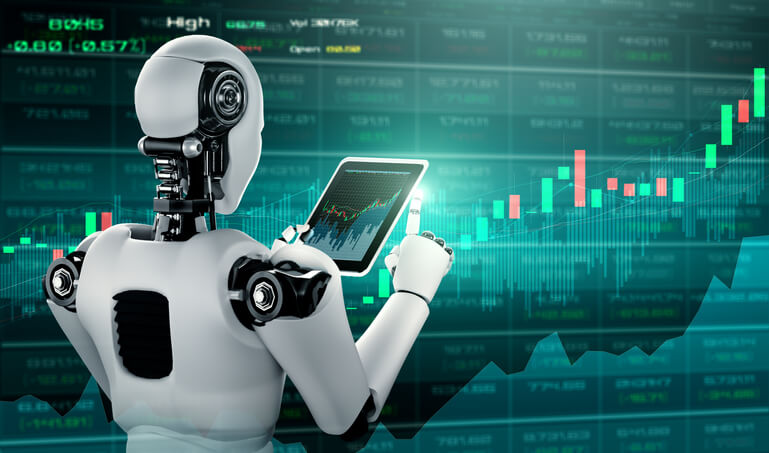Yes, trading robots, also known as automated trading systems or algorithmic trading systems, have the potential to make money in financial markets. These robots are designed to execute trades automatically based on pre-defined trading strategies and algorithms.
Trading Robots

Trading robots can analyze vast amounts of market data, such as price movements, volume, and technical indicators, much faster than human traders. They can identify trading opportunities and execute trades with speed and precision, eliminating human emotions and potential errors.
The profitability of trading robots depends on several factors, including the effectiveness of the underlying trading strategy, the quality of the data used for analysis, and the overall market conditions. It’s important to note that not all trading robots are successful, and there are risks involved in automated trading.
Successful trading robots often require continuous monitoring and adjustments to adapt to changing market conditions. They may also need regular updates to incorporate new market trends or strategies. Additionally, it’s crucial to perform thorough testing and backtesting of the trading robot to ensure its performance and reliability.
While trading robots can potentially generate profits, it’s essential to exercise caution and understand the risks involved. It’s advisable to conduct thorough research, seek professional advice, and consider factors such as risk management, capital allocation, and diversification when using trading robots.
Do Forex Robots Work?

Forex robots, or automated trading systems specifically designed for the foreign exchange (forex) market, can work and potentially generate profits. However, it’s important to approach them with caution and consider various factors.
1. Trading Strategy: The success of a forex robot hinges on the quality and robustness of its underlying trading strategy. A well-designed strategy should incorporate sound technical analysis, risk management principles, and adaptability to changing market conditions. It’s crucial to thoroughly evaluate and test the strategy used by the forex robot.
2. Market Conditions: Forex markets are subject to volatility and can experience rapid changes. A forex robot that performs well in certain market conditions may struggle in others. It’s essential to consider the adaptability of the robot to different market environments and ensure that it has been backtested under various scenarios.
3. Data Quality: Forex robots rely on historical and real-time market data to make trading decisions. The accuracy and reliability of
the data used can significantly impact the performance of the robot. High-quality data ensures that the robot is making informed trading decisions based on accurate information.
4. Continuous Monitoring and Optimization: Forex robots require ongoing monitoring and optimization to adapt to changing market conditions. It’s important to regularly review and update the robot’s parameters, indicators, and risk management settings. Neglecting this aspect can lead to suboptimal performance or losses.
5. Risk Management: Proper risk management is crucial when using forex robots. It’s important to set appropriate risk parameters, such as position sizing, stop-loss levels, and profit targets, to protect against excessive losses. Overleveraging or inadequate risk management can lead to significant losses.
Can Forex Robot Make Money In Real?

Yes, forex robots have the potential to make money in real trading environments. However, it’s important to note that their profitability is not guaranteed, and there are risks involved.
A forex robot’s ability to make money depends on various factors, including the factors mentioned earlier such as the effectiveness of the trading strategy, market conditions, data quality, continuous monitoring, optimization, and risk management.
When properly developed and deployed, a forex robot can execute trades automatically based on its predefined strategy and algorithms. It can analyze market data, identify trading opportunities, and execute trades with speed and precision.
Forex robots can be particularly useful in executing trades with high frequency or in situations where human traders may be prone to emotions or errors. They can operate 24/7 and take advantage of market opportunities even when human traders are not actively monitoring the market.
1. Not all forex robots are created equal: There are numerous forex robots available in the market, and their performance can vary significantly. Some robots may be scams or ineffective, while others may have a solid track record. Thorough research, due diligence, and independent verification of a robot’s performance are crucial before investing real money.
2. Historical performance is not a guarantee of future results: Even if a forex robot has demonstrated profitability in the past through backtesting or historical data, it doesn’t guarantee similar results in the future. Market conditions can change, and the robot’s performance may be impacted by factors that were not present during the backtesting period.
3. Monitoring and optimization are necessary:
Forex robots require ongoing monitoring and optimization. Market conditions change, and adjustments to the robot’s parameters or strategy may be necessary to adapt to new circumstances. Neglecting to monitor and optimize the robot can result in suboptimal performance or losses.
4. Risk management is crucial: Proper risk management is essential when using forex robots. Setting appropriate risk parameters, such as position sizing, stop-loss levels, and profit targets, is necessary to protect against excessive losses. Overleveraging or inadequate risk management can lead to significant financial losses.

Join Us Telegram Group For Free Signals Free Bots Click Here